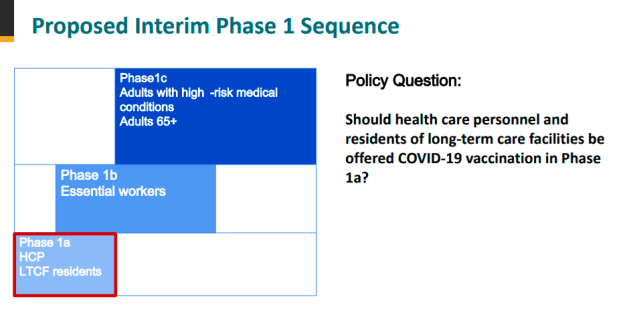The American Bankers Association is seeking vaccine prioritization for bank tellers and frontline community-bank employees. An earlier version of this story suggested that the industry group was seeking a broader prioritization for the financial industry, including traders. The story has been corrected.
Frontline bank employees could get a shot in the arm in the coming months.
Tellers and other consumer-facing bank workers could jump ahead of most Americans for coronavirus inoculations, after vaccines receive widely anticipated emergency-use authorization from the Food and Drug Administration, potentially putting those financial-industry workers in line ahead of those 65 and older, other adults with medical issues and the rest of the U.S. population.
The American Bankers Association, which represents community banks, said it has asked the CDC to designate a narrow slice of the financial-services industry as “essential workers,” mainly adhering to guidelines issued by the Department of Homeland Security.
The ABA said it is specifically asking for vaccine prioritization of bank tellers and employees of rural banking branches.
“From the start of the pandemic ABA members have prioritized the health and safety of their customers and employees. In our conversations with public health agencies, ABA has advocated that among bank employees already deemed ‘essential’ by the government, those that come in contact with the public every day, such as tellers, should be considered for the CDC’s Phase 1b along with essential workers in other industries. The CDC has already designated health-care workers and residents of long-term-care facilities for Phase 1a.”
A vaccine will for several months remain a distant hope for millions, as major Western nations, including the U.S. and the countries of Europe and the European Union, have struck deals with drug manufacturers for COVID-19 vaccines, with initial supplies likely to be extremely limited at a time when cases of the deadly infection are spiking in many parts of the U.S.
Daily Coronavirus Update: CDC forecasts up to 19,500 deaths from COVID-19 in week ending Dec. 26
The Advisory Committee on Immunization Practices, or ACIP, an independent panel made up of health experts, recommended to the Centers for Disease Control and Prevention on Tuesday that vaccines should first go to frontline health-care workers and residents in nursing homes and assisted-living facilities.
But after them, essential workers, a category that could include those working in parts of the financial-services business, are recommended to stand second in line, ahead of those age 65 and older and adults with medical issues that could lead to severe illness should they contract COVID-19.

Essential workers recommended to stand second in line.
Presentation slide from CDC panel
Though it’s an independent panel, ACIP’s recommendations are highly influential within the CDC and are often accepted. This later feeds into the CDC’s official guidance, which, in turn, is passed around the country.
The ACIP didn’t list the occupations of those who might fall in the category of essential workers, but DHS defines essential workers as those who conduct a range of operations and services that are typically essential to continue critical infrastructure operations, and have in the past included firefighters, teachers and grocery workers.
Yet beyond those essential workers, guidance from the DHS’s Cybersecurity & Infrastructure Security Agency indicates that people working in financial services should be included in this category.
Even if the CDC follows the DHS guidance, federal agencies don’t have the final word. Local and state governments have wide discretion in prioritizing vaccine distribution, and in determining which workers are considered essential.
The U.S. on Thursday set the latest in a sequence of records for new cases and fatalities in a single day from the coronavirus-borne illness COVID-19, and the Centers for Disease Control and Prevention said there could be 19,500 deaths in the week ended Dec. 26.
